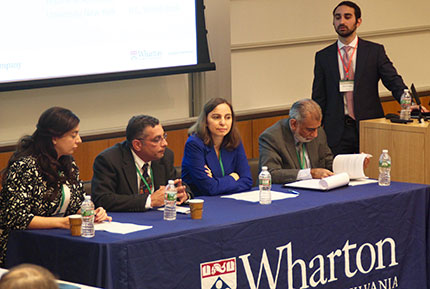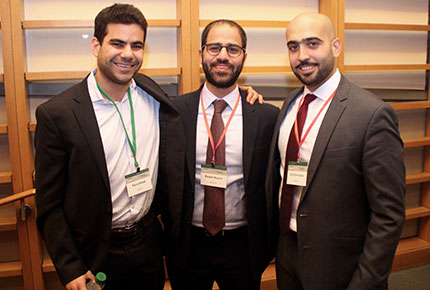LAU showcased at Wharton School of Business MENA Conference
Academic Executive Director of the LAU New York Academic Center takes part in “MENA Emerging: Resilience Amidst Uncertainty” conference.

Lina Beydoun (second from right) participated in the conference, speaking in a panel on youth and unemployment.

Christian Oussi Jr. (right) with fellow M.B.A. students and conference organizers at the Wharton MENA Conference.
Lina Beydoun, academic executive director of the LAU New York Academic Center, joined prominent practitioners, thought leaders, academics and entrepreneurs at the Wharton School of Business in a discussion about the latest developments and trends in fields like energy, entrepreneurship, real estate, and healthcare.
The event that took place earlier this month was entitled, “MENA Emerging: Resilience Amidst Uncertainty.”
Beydoun was invited to speak in a panel on “Youth and Employment.” She touted the region’s prospects, stating that vast numbers of young people coming into adulthood will mean an unprecedented talent pool to create and innovate.
While the MENA region continues to show staggering youth unemployment rates, experts say a lack of education is not the issue. Instead, they highlight various other factors that include a competitive job market where youth lack the skills in demand― often referred to as a “skills mismatch”― an over-reliance on family connections to get jobs, and a lack of opportunities in a thriving private sector, to name a few.
Along with other American universities in the region such as AUB and AUC, LAU is paving way for youth employment and working to bridge that skills mismatch.
“It’s a mistake to constantly associate the youth bulge with unemployment,” said Beydoun. “When you have a large youth population, there’s a huge potential for creativity and entrepreneurship. If that talent can be put to use, with the support of local governments, then the youth bulge could be seen as a positive factor rather than a negative one,” she explained. “In Lebanon for example, if the government supports social entrepreneurship, youth could provide the answer to solving many of the country’s entrenched infrastructure problems, such as waste disposal, electricity shortages, Internet bandwidth and more.”
According to a recent study by the Adnan Kassar School of Business, 78% of its graduates were employed after graduation.
However, said Beydoun, prospects for youth employment across the MENA region are handicapped by a glaring gender gap ― 13 of the 15 countries with the lowest rates of women participating in their labor force are in the MENA region, according to the 2015 Global Gender Gap Report ― and the current economic and political turmoil which, accompanied by the recent decline in oil prices, has deterred international investors.
Organized entirely by Wharton students, the conference provided a glimpse of the prospects for the region from those who are deeply involved in the local economic, political, and social systems.
LAU alumnus Christian Oussi Jr. (B.S. ’11) is currently an M.B.A. student at Wharton, and helped organize the event. “I felt it was important for people to know what the region is about, to be aware of its diversity and to learn about the values that people stand for and which are being misrepresented in the media and are being hijacked by certain fringe groups,” he said. “I wanted to give a better image of what MENA stands for.”
Speakers echoed that positive note, and were united in the belief that the current instability is laying the groundwork for future positive transformation.
The 150 participants included students from leading U.S. universities, including Penn, Columbia, Duke, George Washington, Harvard, Johns Hopkins, and Penn State, who plan to connect their careers to the region.
More
Latest Stories
- Into the Psychology of Justice
- Alumnus Zak Kassas on Navigation, Spoofing and the Future of GPS
- Hearing Between the Lines
- LAU Hematology Conference 2025: Advancing Science Through Interdisciplinary Exchange
- Dr. Chaouki T. Abdallah Invested as LAU’s 10th President
- LAU Guides Its Students Through the Code of Conduct
- Innovative Procedure at LAU Medical Center–Rizk Hospital Signals Hope for a Patient With a Congenital Disease
- LAU’s Inaugural PodChat Session Addresses AI Detection in the Classroom

